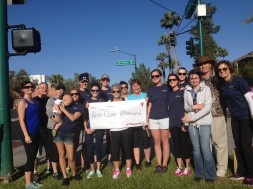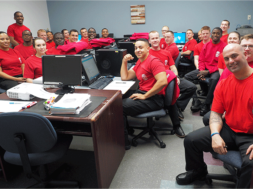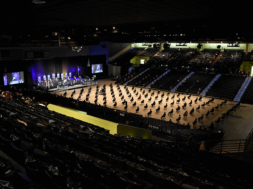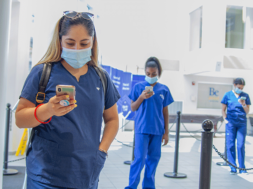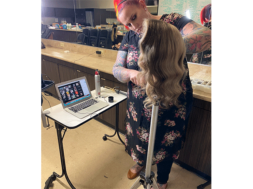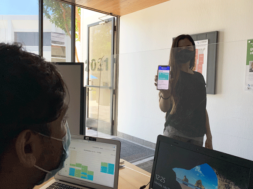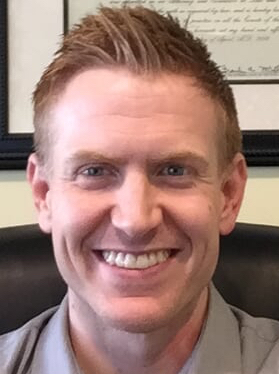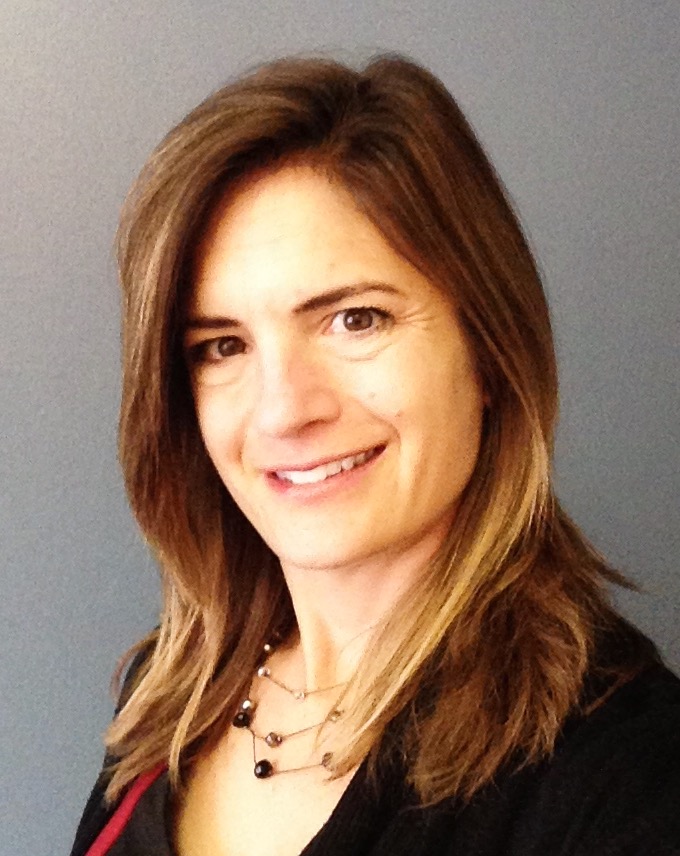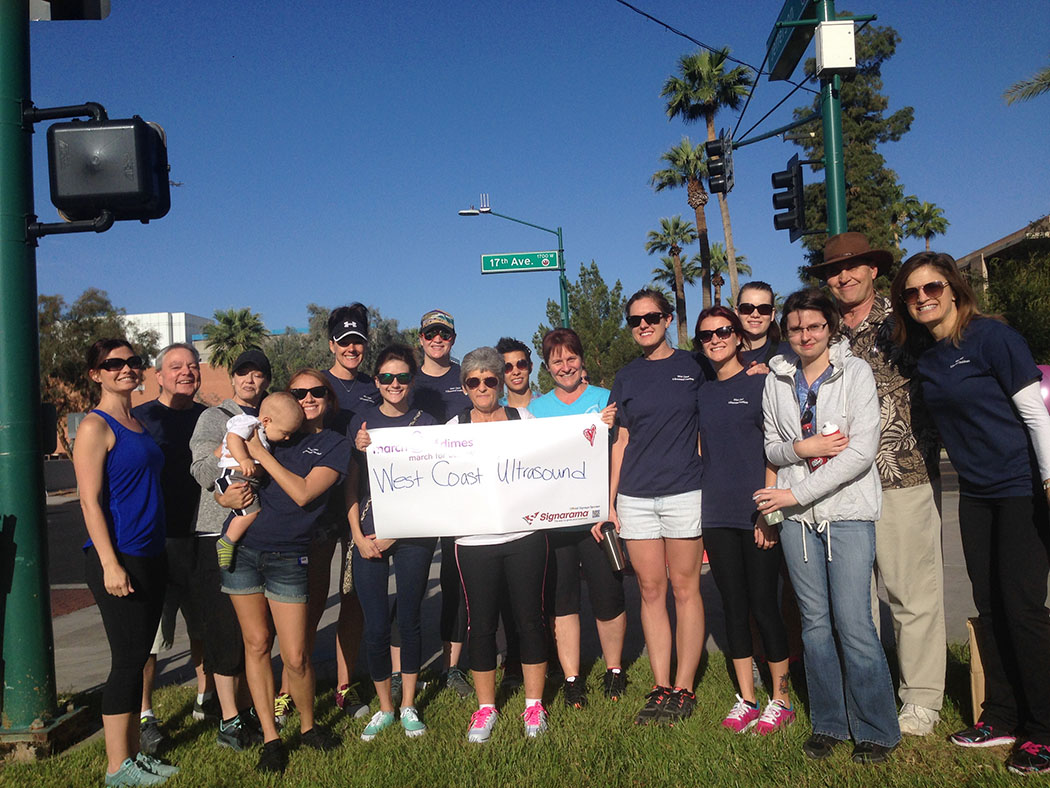
Community Outreach – Worth the Investment
By Andrew High, Chief Operating Officer and Susan Ciardullo, Regional Director of Career Services and Community Outreach, West Coast Ultrasound Institute
In the wake of expanding regulation, unannounced audits, and an increasingly complex compliance environment, community outreach is likely the first line of the budget that gets scrapped. This article will attempt to show you why structured community outreach efforts are worth the investment.
Community outreach may seem like a nebulous topic, but when backed by the strength of strategic direction, it becomes more concrete and valuable. Initially, focus on activities that positively impact both your student and employee cultures. Make sure the events that you choose to participate in have a strong correlation with your programs, which is made clear to students. Finally, promote and explain your chosen efforts to make sure they resonate with and excite your student and employee population.
We (West Coast Ultrasound Institute) are a small school with three campuses – two in California and one in Arizona. Our programs are in the ultrasound, MRI, and nursing fields and we offer them at the certificate, associate, and bachelor’s degree level. So, in choosing outreach efforts, we focus on community events where our students can exercise and reinforce the skills that they are learning in the lecture and clinical lab setting. Here’s an example:
Last month, we sent 17 students and three faculty members from our Phoenix campus to the U.S. Vets transitional facility where they performed over 100 ultrasound scans for Veterans (and 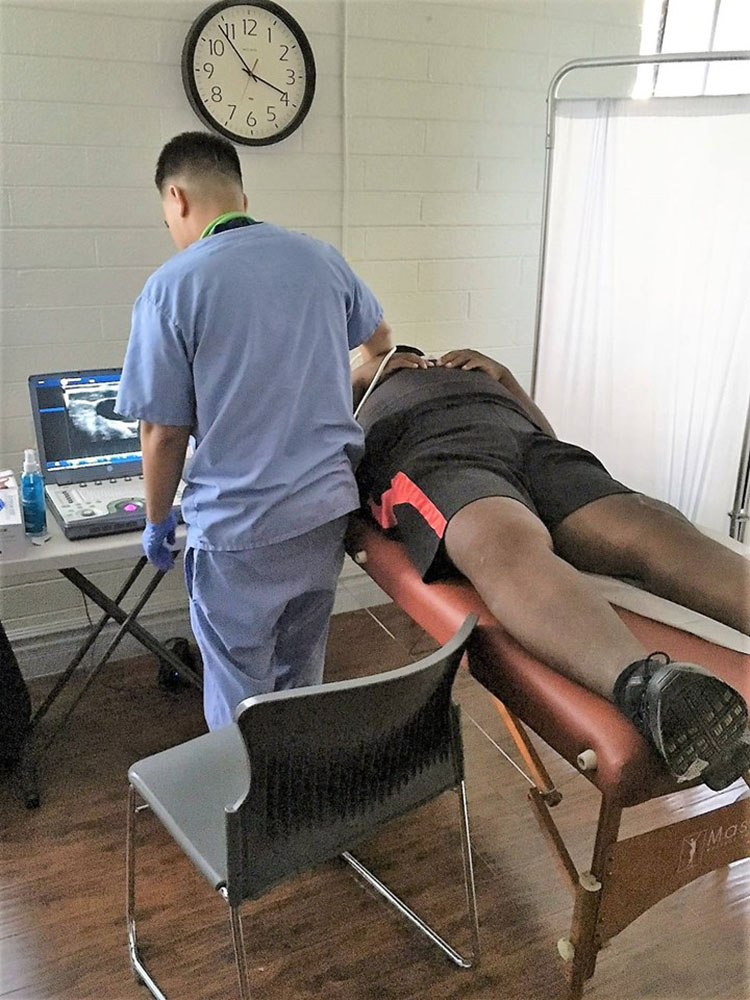 even one service dog!). If you spend a little time looking and follow up properly, similar opportunities will arise and become more numerous as your positive reputation and community network expands. In fact, opportunities abound in nearly all work related arenas – from health fairs and expos to healthcare conferences – we have been able to step in and offer free services as a way to give back to area communities. At these events, our students gain real world clinical experience in a fast-paced environment where our staff can guide the process and provide assistance to the students who are often pushed to the limits of their still-growing abilities. Community outreach events can also take shape in many other forms. Through experience we have found that the best ones are those that allow students to participate by engaging with patients and applying skills learned in their program’s respective field of study (in our case, by offering free ultrasound scans). So focus your community efforts on events that will engage your students and benefit the community. Cosmetology schools can give free haircuts to the homeless, massage therapy schools can give free massages to the underprivileged, and nursing schools can provide basic checkups at health fairs – the list goes on!
even one service dog!). If you spend a little time looking and follow up properly, similar opportunities will arise and become more numerous as your positive reputation and community network expands. In fact, opportunities abound in nearly all work related arenas – from health fairs and expos to healthcare conferences – we have been able to step in and offer free services as a way to give back to area communities. At these events, our students gain real world clinical experience in a fast-paced environment where our staff can guide the process and provide assistance to the students who are often pushed to the limits of their still-growing abilities. Community outreach events can also take shape in many other forms. Through experience we have found that the best ones are those that allow students to participate by engaging with patients and applying skills learned in their program’s respective field of study (in our case, by offering free ultrasound scans). So focus your community efforts on events that will engage your students and benefit the community. Cosmetology schools can give free haircuts to the homeless, massage therapy schools can give free massages to the underprivileged, and nursing schools can provide basic checkups at health fairs – the list goes on!
The principles behind sourcing and staffing successful community outreach events are the same at almost any institution; opportunities exist that are relevant to your program mix and student and employee population, you simply have to commit to finding them and following through. Once you do, you will find that you have enhanced your brand and have helped to bring our sector some much-needed goodwill. Your students, your employees, and your accreditor will appreciate that you have placed an outward focus on engaging and benefiting the community.
Once you’ve established a mix of events that work for your institution, create a mechanism to generate student interest. In our case, we created a community outreach award and give an award certificate (upon graduation) to any student that completes more than 50 hours of community outreach while they are a student. In competitive fields, this can certainly help to catch an employer’s eye and serve as a marker for the graduate’s character – a characteristic that our employers universally value.
Your entire campus will benefit from having a strong school presence in the community. The admissions department will feel more convicted in addressing students with genuine passion when they understand the school’s focus is much larger than tuition. Career services staff members will feel confident that the school is working to provide opportunities for students to network with the larger community and are willing to get creative about finding employment opportunities. And your faculty can be certain that graduates are well rounded and understand the value of giving back to their community long after they have left your campus.
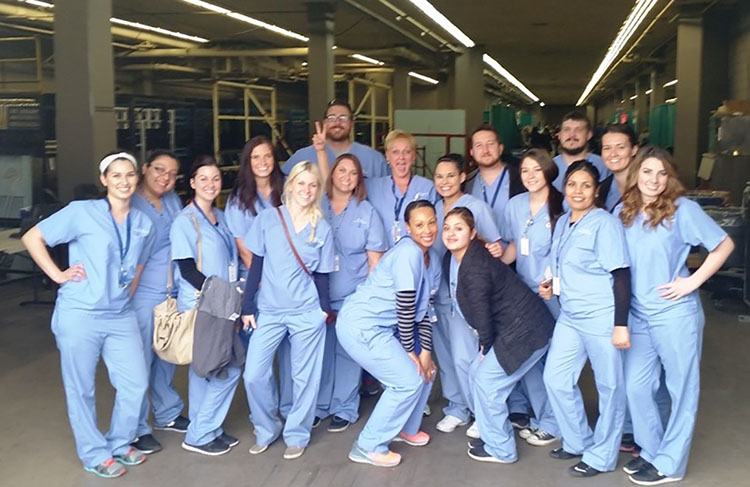 Another practical step to take in shifting the perspective of the organization beyond its walls is to push your career services directors to think about their planning and actions in the scope of the long-term future. This means thinking about and cultivating opportunities for community outreach with an aim to establish your school in the community framework. Consider building a network of employers and plotting outreach events that connect with certain employers, or even prospective employers as a way to foster new business relationships. We all know that soft skills can be a barrier to employment for some of our graduates. By aligning your brand with another that strongly values community outreach, you begin to overcome this perception while instilling a sense of community interest in your graduates.
Another practical step to take in shifting the perspective of the organization beyond its walls is to push your career services directors to think about their planning and actions in the scope of the long-term future. This means thinking about and cultivating opportunities for community outreach with an aim to establish your school in the community framework. Consider building a network of employers and plotting outreach events that connect with certain employers, or even prospective employers as a way to foster new business relationships. We all know that soft skills can be a barrier to employment for some of our graduates. By aligning your brand with another that strongly values community outreach, you begin to overcome this perception while instilling a sense of community interest in your graduates.
After an event takes place, make sure all of your students and staff are aware that it took place, why the school participated, and what it means with respect to your mission. Here’s a snippet that captioned one of our Facebook posts outlining the U.S. Vets event I mentioned above: “WCUI is proud to have partnered with US Vets, the nation’s largest nonprofit serving Veterans. We have provided this free screening to two locations in Phoenix, and have a third event scheduled for Prescott, AZ with future events in the works for the southern California area. WCUI is excited to give back to our veterans and will continue to seek ways to do so in the future!” Such posts are helpful in increasing awareness, student and employee engagement, and reinforcing positive brand values.
Focusing on the veteran community
After finding some success with veteran community outreach initiatives, we chose to focus on the veteran community. Arizona seemed to have a more established infrastructure for connecting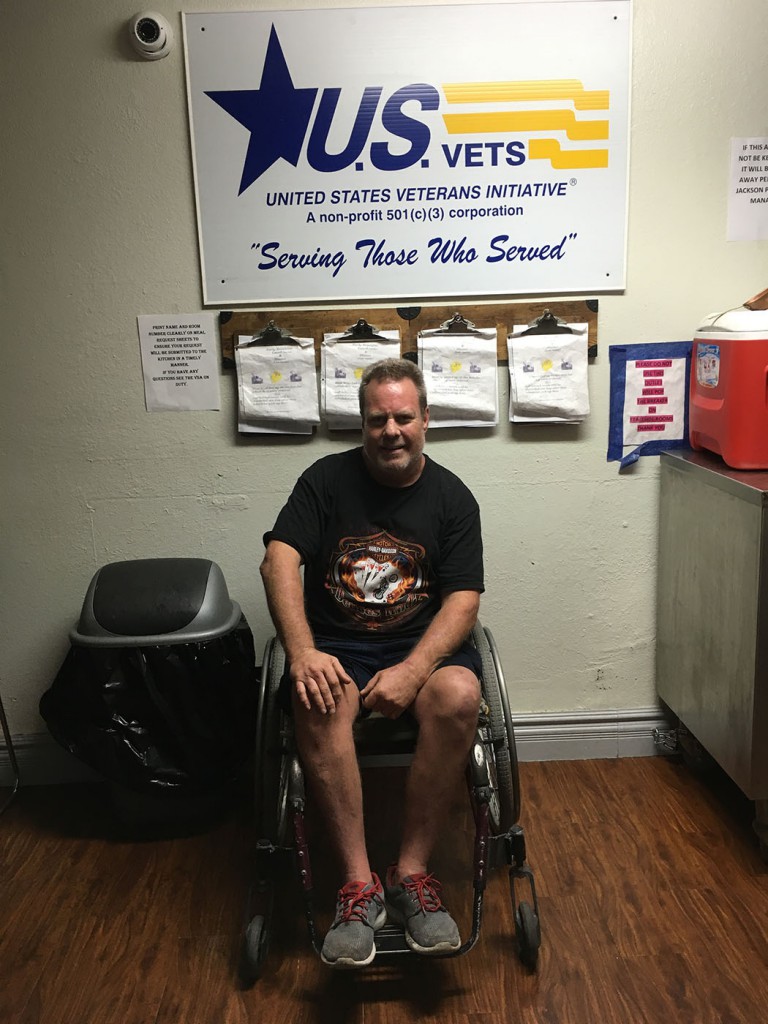 with Veteran communities and organizations, so we started there. Any institution can very easily state that it supports veterans, but how can its staff and students really give back to the military community and measure their effectiveness? For us, this journey began last year with an exploration of the Veteran Supportive Campus certification that was established by state law in Arizona. After receiving approval as a certified Veteran Supportive Campus, we have gone on to serve hundreds of veterans, service members and their families in the community while also positively shaping the identity of our school.
with Veteran communities and organizations, so we started there. Any institution can very easily state that it supports veterans, but how can its staff and students really give back to the military community and measure their effectiveness? For us, this journey began last year with an exploration of the Veteran Supportive Campus certification that was established by state law in Arizona. After receiving approval as a certified Veteran Supportive Campus, we have gone on to serve hundreds of veterans, service members and their families in the community while also positively shaping the identity of our school.
Reviewing the legislation was an admittedly big task for a fairly small school, as the certification guidelines are extensive. After attending the Arizona Coalition for Military Families (ACMF) Annual Statewide Symposium in Support of Service Members in April 2015, the ACMF, ADVS and other mentoring institutions there showed us a way to scale the program smaller and fit our student veterans’ needs with the help of the Sector Specific Guidelines – Higher Education Institution Addendum.
Under Arizona statute (A.R.S 41-609), a postsecondary institution can apply to be certified as a Veteran Supportive Campus by the Arizona Department of Veterans’ Services (ADVS), providing it meets the guidelines of C.A.R.E.:
Connect to the culture: we conducted annual surveys of veteran students to understand what campus resources they need, and created a veteran student steering committee that meets quarterly and provides feedback to our campus management.
Ask the right questions at the right time: we connected with the group in charge of administering statewide training on veteran issues and resources available to veterans – the Arizona Coalition for Military Families (ACMF) – who came on-site and provided over 20 school employees with training on issues affecting the military, veteran and family member population.
Respond effectively: we created a dedicated veteran resource center inside of each campus’ learning resource center. WCUI also refers veterans to 411, an organization specially trained to help veterans as well as civilians in times of need. In addition to professional resources, student veterans are offered informal mentoring with several staff and faculty members who are also veterans.
Engage in the Military/Veteran Resource Network (source: www.azdvs.gov). Establishing relationships with veteran organizations has been the most impactful contribution that WCUI has made to the community since becoming a Veteran Supportive Campus. We’ve worked with Veterans Helping Veterans, U.S. Vets, Veterans Stand Down, Luke Air Force Base, and the Phoenix Veterans Administration Health Care System. We have held yearly free heart screenings for veterans called “Healthy Hearts for Heroes” through our on-site clinics. Each of these events involves students providing medical imaging services at no cost, under the supervision and guidance of faculty. At one Phoenix Veterans Stand Down event, we performed 637 exams on veterans resulting in 100 doctor referrals for follow up care.
The culture of giving back to the community has served to empower student veterans, as they have consistently spearheaded clothing and food drives for veterans in need from the outside community. We were also proud to honor our student veterans on campus with a visit by both Director Wright from ADVS and Lieutenant Colonel Robin Johnson from the Office of the Joint Chiefs of Staff. In addition, our students provide externship support to several veterans’ facilities including Luke Air Force Base and the Phoenix VA Medical Center.
We’re always looking for ways to connect with our community and we believe we have the evidence to establish that community outreach is a worthwhile venture for your students, staff, faculty, and school as a whole. Developing your brand and reputation as a school that is invested in broad, measurable community outcomes will help your students and graduates by adding value to their education and degree while meaningfully benefiting your school’s long-term position in the community. So, before cutting or dismissing efforts to include community outreach efforts in your strategic plan, look beyond the numbers and consider making the more difficult but ultimately more fruitful choice to give back to your community, while establishing your school within the right strategic community framework and meaningfully engaging your students and employees in the process.
ANDREW HIGH is an accomplished education executive and attorney working as COO and General Counsel for West Coast Ultrasound Institute (WCUI). At WCUI, he focuses on business analytics, risk management, marketing strategy, financial analysis, compliance, and management development. Andrew also works for the UCLA Price Center for Entrepreneurship & Innovation as a strategic consultant, is licensed to practice law in California and Arizona, and is an executive MBA student at UCLA. He is excited to be a new member of the Career Education Review Advisory Board.
Contact Information: Andrew High // COO // West Coast Ultrasound Institute // 310-289-5123 // andrew.high@wcui.edu // Social Media (Andrew): https://www.linkedin.com/in/andrew-high-69b7602b // Social Media: (WCUI): https://www.linkedin.com/company/west-coast-ultrasound-institute?trk=top_nav_home, https://www.facebook.com/WestCoastUltrasoundInstitute/ // www.wcui.edu
SUSAN CIARDULLO, Regional Director of Career Services and Community Outreach, has served the higher education sector since 2001. For 15 years, she has worked to help change people’s lives through training and education. Prior to working in allied health for West Coast Ultrasound Institute in her current role, Susan has led and managed and taught postsecondary programs in nursing, information technology, electronics technology, drafting and design, business and criminal justice.
Susan represents the private postsecondary education sector in the state of Arizona as a member of the Board of Directors for the Arizona Private School Association. As their Special Events chair, she organizes the annual Training EXPO on WIOA for American Job Center case workers with Eligible Training Providers. She also serves as Commissioner, appointed by the Governor, for the Arizona Commission for Postsecondary Education. Susan advocates for alternate pathways for training so that all learners have an opportunity to increase knowledge and advance their careers.
With dual roles in career services and community outreach, Susan connects with the community to create partnerships with employers, nonprofits and government agencies. In addition to her board and commission appointments, Susan also serves on the Director’s Advisory Council for Veteran Supportive Campuses with the Arizona Department of Veterans Services, on the Advisory Board for the Peoria MET Academy, on the Governing Board for the Sequoia Ranch School, on the planning committee for Junior Achievement’s annual “You’re Hired” event, and on the Advocacy and Government Affairs Committee for the March of Dimes.
Susan earned her Master of Business Administration degree from Marquette University in 1996. She also has a Bachelor of Science degree in Mathematics with minors in Economics and Spanish from Marquette. She enjoys living in sunny Arizona with her husband, daughter, and Chihuahuas.
Contact Information: Susan Ciardullo // Regional Director, Career Services and Community Outreach // West Coast Ultrasound Institute // 602-954-3834 // susan.ciardullo@wcui.edu // Social Media: https://www.linkedin.com/in/susan-ciardullo-50311a2 // www.wcui.edu
